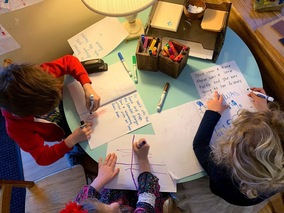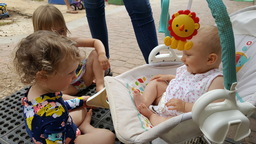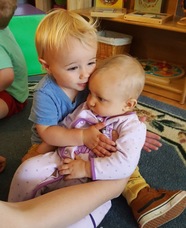Philosophy
The Lucy Brock Child Development Laboratory (LBCDL) is influenced by a number of theorists, including Jean Piaget, Lev Vygotsky, Jerome Bruner, and Howard Gardner. The infant-toddler program draws upon the works of Magda Gerber and her concept of responsive caregiving. One particular source of inspiration is Reggio Emilia, a small town in northern Italy whose infant-toddler and preschool programs have received worldwide acclaim. Key elements of our adaptation of this approach are:
 Children as competent
Children as competent
All children are competent and capable. The goal is to help children realize their potential by supporting the continued development of competence. Guidance strategies utilized at LBCDL entail supporting children's abilities to problem-solve as independently as possible according to their abilities and developmental levels. A fundamental component of the philosophy of LBCDL is that children should never be demeaned or discouraged; instead children should be encouraged to become effective decision-makers. In addition, children should be given the means to represent their developing theories about the world in many different formats. These formats may include, but are not limited to, dramatic play, art, writing, storytelling, block play, manipulative play, sand and water play, music, and movement.
Children with special rights
All children from any cultural or ethnic background, whatever social or economic status, and with or without disabilities have a right to the best possible care and education. LBCDL endeavors to promote the greatest possible diversity in the groups of children served. The importance of community: Relationships are the essence of education. Each person in the community has a responsibility to engage with and contribute to the efforts of the group as a whole. The LBCDL community consists of children, families, staff, students, and university faculty. All play a key role in role in creating a sense of connectedness.
Consistency and continuity of care
Continuity and predictability are key ingredients for successful development of young children. LBCDL strives to maintain consistency and continuity in care for young children. To accomplish this, multi-age grouping is utilized so that children remain with the same caregiver for multiple years.
 Environment as co-teacher
Environment as co-teacher
The environment serves as a teacher. Much thought and reflection goes into planning an environment that is safe, beautiful, comfortable, and invites children to think, explore, investigate and create.
Emergent or negotiated curriculum
Curriculum should reflect children's current developmental levels and interests and should be grounded in children's most natural form of learning, play. Therefore, curriculum should emerge from developmental observation; therefore, the faculty and teachers watch and listen closely to children and develop hypotheses about the big ideas that underlie children's actions and conversations. Based on these observations, we develop invitations to play. These invitations are created to allow children to communicate discoveries and questions in words, in actions, in pictures or in writing. Our goal is to sustain and deepen children's learning and development through utilizing their emerging interests.
Documentation
LBCDL utilizes written notes, audio/videotape, and still photography to record the life that happens in the classroom so that adults can revisit experiences with children to plan more carefully future objectives and activities. The process of documentation helps the adults (families, students, staff, faculty) to be reflective about the children and what is revealed in their play.
 Reflective practice
Reflective practice
Reflection is a critical component of the Reggio approach. Reflection is encouraged at all levels of our program. Children, families, staff, students and faculty are all encouraged to engage, individually and with each other, in reflection about the interactions and experiences of the classroom.